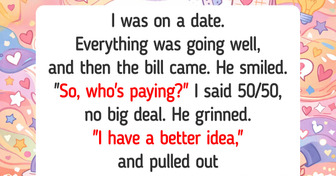Nope. Nope. Nope. If the office is throwing a party then they should make everyone aware they need to pay for things well beforehand. If you have to pay for it then they should make sure you order what you want, not a buffet style. Paying for your own meal makes it not a team sport. If it is paid for by the business, then it is a coworker experience. She came, she talked, and she made an effort. What happens if she had a nu allergy and there were walnut chocolate cake or peanut asian dishes? Should she still try to eat? I get allergy and a lifestyle option are two different things but for everyone knowing she is a vegan, for them not to include vegan food is creating a hostile work environment and unacceptable. She needs to report her manager to HR for being hostile, making jokes about what she eats, singling her out. And again, I would never go to a party from work and then oh by the way pay me before you leave...excuse me?! What if I left my wallet and everything at home? And $40 for a meal?! Where are they eating?! I am betting you alcohol was not included. That new manager is pocketing money.
I Refused to Chip In for a Non-Vegan Office Party, Now HR Wants to Talk
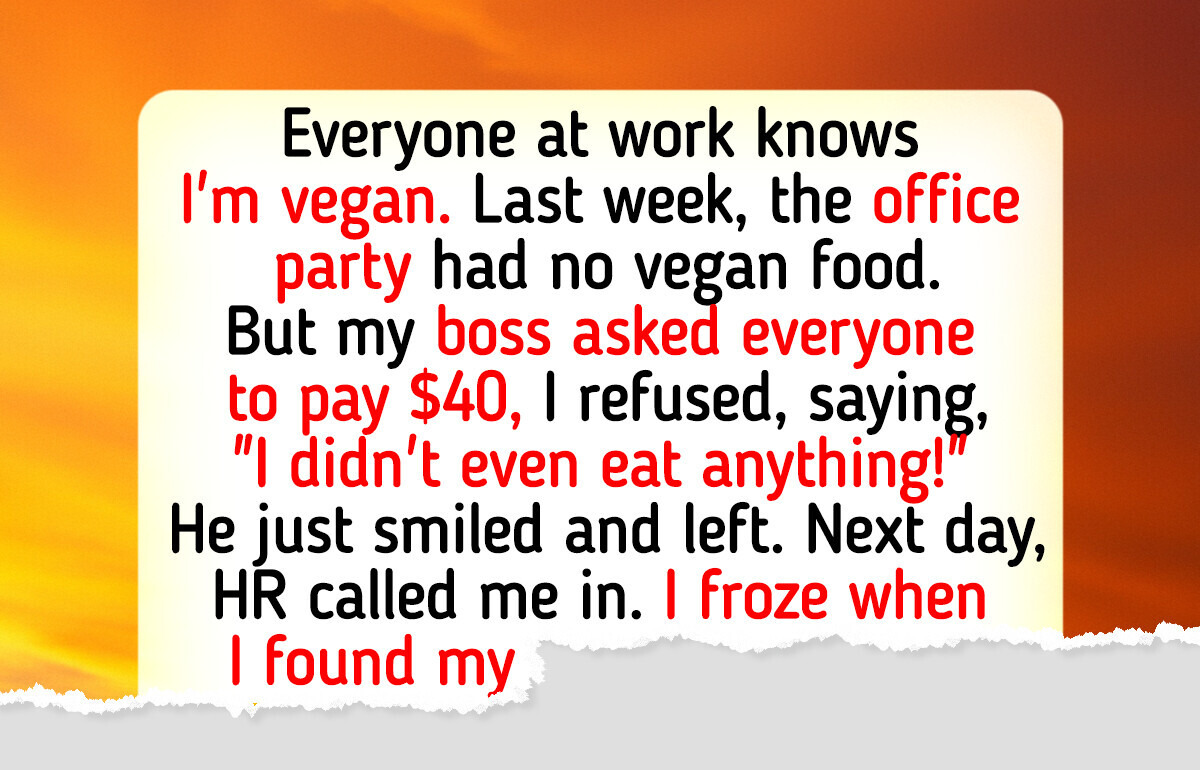
Food choices may seem trivial to some, but for others, food is tied to identity, belief, and the way we choose to live. When it feels like someone doesn’t respect this, it can leave you questioning your place. That’s what happened to Laura (F, 27).
Here’s her story:
I’ve worked at my company for years, and everyone knows I’m vegan. It’s not a secret, and it’s not something I ever made a big deal about. Most of my coworkers aren’t bothered by my food choice, and although I’ve occasionally had to deal with the “rabbit food” joke, I’ve always taken it in good spirit.
A party I was looking forward to.
It was our team party last week. It’s sort of a quarterly tradition to celebrate hitting our sales goals. The entire team pitches in, and it’s just a happy celebration with food, drink, and music. It’s been a tough quarter, but I managed to do really well, so I was looking forward to this celebration.
When we were taking polls on where to order food, I suggested places with both vegan and non-vegan options. I assumed, very reasonably, that there would be something I could eat.
The buffet was amazing but there was a small problem.
On the day of the party, I walked in, hungry, ready to celebrate with my coworkers. The buffet looked amazing. People were piling their plates high, but when I walked along the table checking dish after dish, I realized that every single item had meat, cheese, mayo, or butter. There was nothing for me, not even a salad or a fruit bowl.
It felt deliberate.

Hi, sorry you had to go through that. We should respect whatever but we choose to eat. We used to farm in Iowa here and I won't eat any meat products anymore. We have been off all animal products for years thankfully and I don't have high cholesterol or heart disease. Also I saw how growth hormones were added to animal feed for years already since the '70s that I know of. All the pesticides herbicides anybody who eats any animal products is not smart at all. You can show your boss this email if you want to he can contact me if he wants to but he's ruining his own health by eating any animal products. The first human was told to eat from plants and trees it's in the Bible.
The team knew I was vegan, and usually someone would make sure that there would be at least one vegan dish for me. I didn’t say anything. I just poured myself a drink and sat with everyone, so I wouldn’t look like the odd one out.
When my coworker noticed I had nothing on my plate, I quietly asked her who had been in charge of the food. She told me it was the new manager, and suddenly it made sense.
The disrespect was obvious.
This manager had made it a point to always mock my food choices ever since he found out I was vegan. I thought it was just his sense of humor, but this deliberate dig at the party felt too personal. There was no way he could have forgotten there was a vegan on the team, especially since it was something he mentioned almost every day in the office.
When it was time to pay, I stood my ground.
I didn’t want to ruin anyone’s mood, so I didn’t say anything. But right before we wrapped up, the manager demanded, “Alright everyone, $40 per person for the party. Pay me before you leave.” I said, “I didn’t eat anything... there were no vegan options.”
My coworkers seemed surprised, although no one said anything. The new manager gave me this tight, almost amused smile and said, “It’s mandatory. Everyone pays. There was food for everyone, if you didn’t like it, that’s your problem” And then he walked away.
I stood there holding my wallet, feeling stupid and singled out. But I refused to pay.
I thought HR would take my side.
The next day, when I went to the office, everyone seemed quiet around me. No one mentioned the incident at the party, but no one seemed to be on my side. It was clear that everyone was worried that they would offend the new manager.
The worst was when I found an email with the subject line, “Formal HR Meeting — Attendance Required.” My stomach dropped. I couldn’t believe he had reported me.
I walked in expecting a discussion. Instead, there was a document already printed out with my name on top.
Seeing the write-up really upset me.

Should have brought in a bazooka and unloaded it in the supervisors rectum and then went for a burrito.
The HR manager slid it toward me: an official written warning for “failure to participate in required team activities.” I just stared at it and tried to explain what happened: the lack of vegan options, the fact that I wasn’t refusing to participate, I just wasn’t comfortable paying for food I didn’t receive.
She nodded politely but kept repeating the same line: “Participation includes equal contribution to shared experiences.” It was clear that I was alone in this. I signed it because I didn’t have a choice.
Walking out of that office, I felt smaller than I had in years.
Quitting doesn’t seem like an over reaction.
When I got back to my cubicle, no one said anything to me, only the new manager gave me a small, smug smile. After that, everything at work felt different. The laughter, the meetings, even the small talk.
I keep thinking: If one tiny, reasonable boundary leads to punishment... what else will?
I’m mad at the new manager and at my coworkers who have worked with me for years. I no longer feel respected here, and I’m seriously considering handing in my two weeks notice. My partner told me to wait it out, but I just can’t bring myself to do it.
What would you do if you were in my place?
Laura
Here’s our advice:
- Pause and stay calm, even if the write-up feels insulting: HR expects emotional reactions. Staying composed keeps the power with you, not them.
- Ask for the exact policy you violated, in writing: Don’t accept vague terms like “team participation.” Request: “Could you show me the written policy this falls under?” This often reveals there isn’t one.
- Request the names of everyone involved in the decision: This shifts the dynamic immediately. It signals: You’re documenting this.
- Add your own written statement to the HR file: You have the right to attach your version of events to any disciplinary record. This protects you later.
- And if things don’t improve, quietly update your résumé: Not out of defeat — out of self-respect.
HR is supposed to make the workplace easier, but sometimes things don’t work the way they should. Here’s another story about a reader who turned the tables on HR after they were denied their vacation days. Do you have an HR horror story? Let us know in the comments!
Comments
I wouldn't have signed their report
The workplace cannot force you to attend events that must be paid for by the employee. This is probably wage theft, or something along those lines. You need a labor lawyer, have them send something on official letterhead stating your intention to sue. That's normally enough to make them back off and treat you with kid gloves going forward. If not, you do have the makings of a low-key labor lawsuit, who knows how long they've been doing this or how many people they've done it to, they could be looking at some serious fines.
Veganism is protected under the equality act in the UK, where it is due to religious or ethical beliefs. Here this situation could be construed as harassment and, if you quit, constructive dismissal.
Is there not an equivalent law where you are? Worth seeking advice from a professional.
Feels like discrimination to me
I don't think it is even legal to force you to attend a company event where you have to pay. Get a formal copy of the document you signed and have a lawyer review them. Look for a job somewhere as well. That company is not a good place for you.
Related Reads
I Bought a Lavish Secret Santa Gift and Received a Cheap, Insulting One in Return

I Refuse to Be Underpaid While Training Someone Making $35K More—So I Got Even
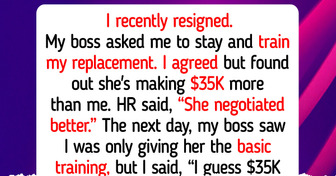
I Refused a Salary Raise at My Job, Then My Boss Played Dirty
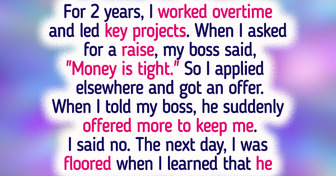
15 Insider Stories From Cabin Crew You Might Not Hear on a Plane

A Stranger Humiliated My Daughter at Disney World—He Picked the Wrong Mom to Mess With

15 Times Someone Showed Kindness Without Saying Anything
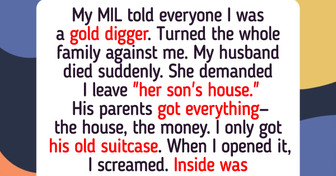
I Refused to Share My Inheritance With a Family That Didn’t Accept Me
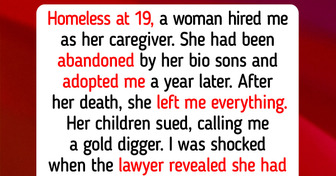
I Kicked My Parents Out of My Graduation—They Didn’t Contribute to My Education

I Cut Off My Parents After They Demanded My Inheritance—and I Don’t Regret It
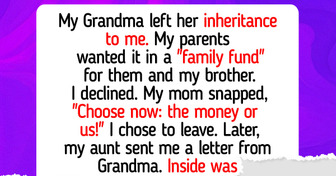
I Refuse to Return My Late Colleague’s Paycheck, Now His Widow Is Furious

12 Stories That Prove Kindness Is the Strongest Armor
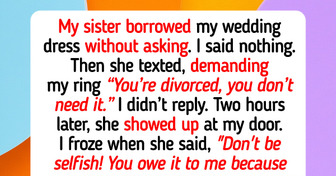
14 Dates That Started Like Movies but Ended Like Sitcoms
